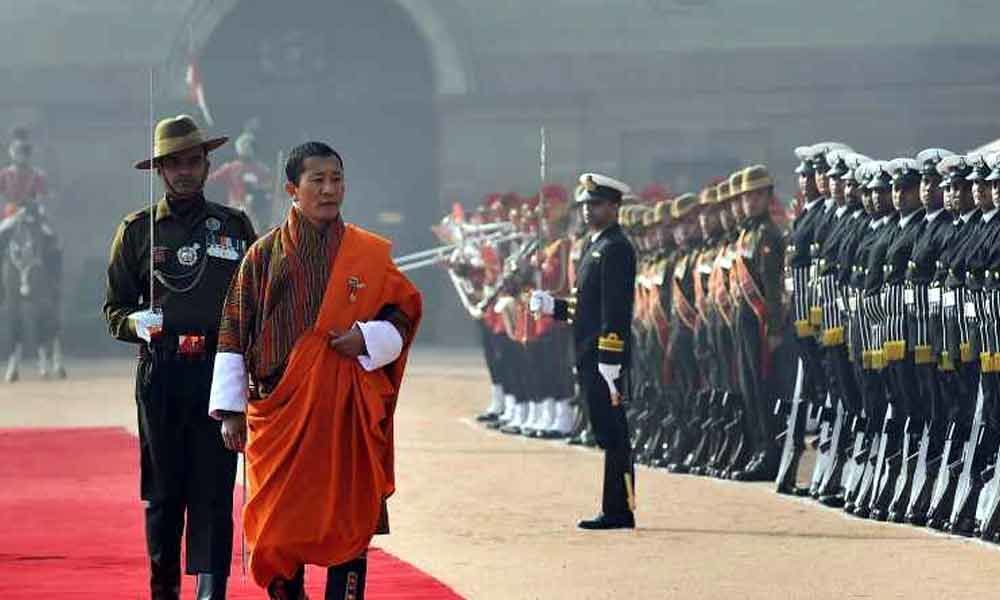Live
- Biden Pardon: Joe Biden Commutes Death Sentences of 37 Inmates, Including Child Killers and Mass Murderers
- South Korea: Yoon believes impeachment trial takes priority over martial law probe
- Strict Action for Non-Adherence to Time Management - DMHO Dr. Swarajya Lakshmi
- Over 13.29 lakh houses approved for rural poor in Maharashtra: Shivraj Chouhan
- District Collector Urges Timely Completion of Indiramma Housing Scheme Survey
- Digital Arrest Scam: Hyderabad Man Duped of ₹7 Lakhs by Fake Crime Branch Police Callers
- Sukhbir Badal seeks President's Police medal for officer who saved his life
- US Firm Accordion Acquires Merilytics, Launches 1,500-Seater Office in Hyderabad
- Free Medical Camp Organized by Alampur Advocate Bar Association
- Allu Arjun Receives Notices from Police for Further Inquiry
Just In

Now as prime minister, he spends Saturdays treating patients referred to him and Thursday mornings offering medical advice to trainees and doctors.
THIMPU: It's Saturday in Bhutan and Lotay Tshering has just completed urinary bladder repair surgery on a patient at the Jigme Dorji Wangchuck National Referral Hospital.
But Tshering is no ordinary doctor.
During the week, he also happens to be prime minister in the Himalayan kingdom famous for measuring citizens' Gross National Happiness.
"For me it's a de-stresser," said Tshering, who was elected prime minister of the nation of 750,000 people last year in only its third democratic election since the end of absolute monarchy in 2008.
"Some people play golf, some do archery, and I like to operate. I am just spending my weekends here," the 50-year-old told AFP.
No one at the hospital bats an eyelid as Tshering, wearing a faded lab coat and crocs, walks through the busy corridors.
Nurses and hospital attendants continue with their jobs as normal.
The Buddhist kingdom is in many ways a case apart, benchmarking itself on happiness instead of economic growth.
One of the pillars of Gross National Happiness is conservation of the environment.
Bhutan is carbon negative and its constitution mandates that 60 percent of the country remains forested.
It is also big on ecotourism and charges a daily fee of $250 per visitor in high season.
The capital Thimphu has no traffic lights, the sale of tobacco is banned, and television was only allowed in 1999.
Archery competitions, with liberal amounts of the local firewater, are a national craze.
Phalluses painted on houses to ward off evil are also a common sight.
But the "Land of the Thunder Dragon" also has its problems, among them corruption, rural poverty, youth unemployment and criminal gangs.
Tshering, who trained in Bangladesh, Japan, Australia and the United States, began his political career in 2013, but his party failed to make headway in that year's election.
After losing, King Jigme Khesar Namgyel Wangchuck commanded him to lead a team of doctors and travel with the monarch's entourage to far-flung villages to provide free medical treatment.
Now as prime minister, he spends Saturdays treating patients referred to him and Thursday mornings offering medical advice to trainees and doctors.
Sunday is family time.
Back in the prime minister's office, a lab coat hangs on the back of his chair.
This, he said, serves as a reminder of his election pledge to focus on healthcare.
Patients don't have to pay directly for healthcare in Bhutan, but Tshering says that much more remains to be done despite important strides in medical treatment.
While the country has seen major improvements in life expectancy, a reduction in infant mortality and the elimination of many infectious diseases, the number of lifestyle diseases -- including alcoholism and diabetes -- is on the rise.
"We must now slowly put more focus on secondary and tertiary healthcare," Tshering said.
At the hospital, Tshering's patient, a 40-year-old man named Bumthap who underwent a five-hour bladder repair surgery, told AFP he was pleased with the results.
"Now that I have been operated on by the prime minister, who is considered one of the best doctors in the country, I feel more relieved," he said.
Politics, the prime minister said, is a lot like being a doctor.
"At the hospital I scan and treat patients. In the government, I scan the health of policies and try to make them better," he said.
"I will continue doing this until I die and I miss not being able to be here every day," he added.
And on the days when he drives his car around the capital Thimphu -- instead of using his official chauffeur -- an-all-too familiar urge takes hold of him.
"Whenever I drive to work on weekdays, I wish I could turn left towards the hospital."

© 2024 Hyderabad Media House Limited/The Hans India. All rights reserved. Powered by hocalwire.com







